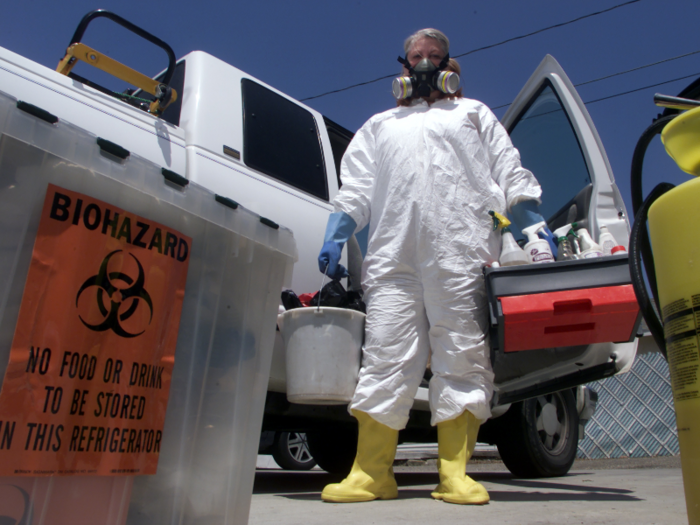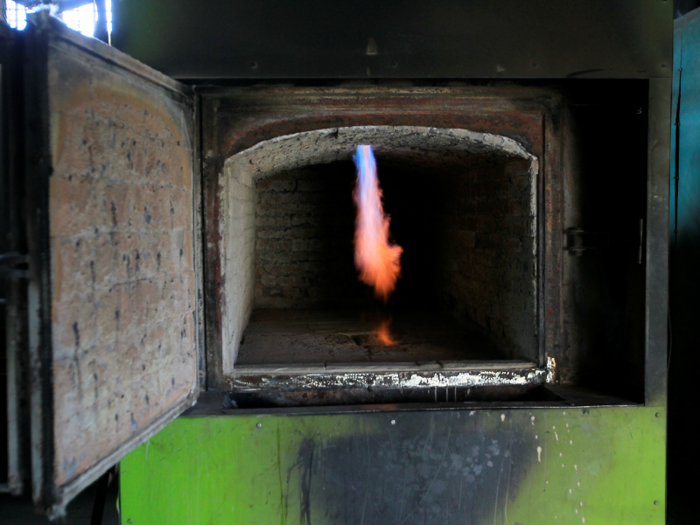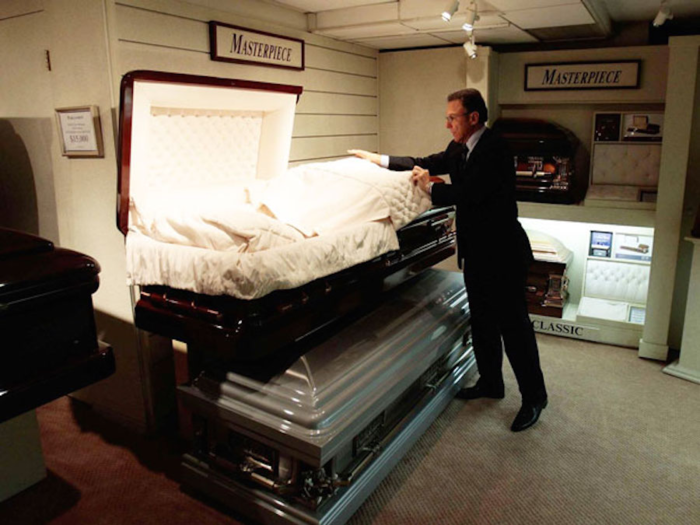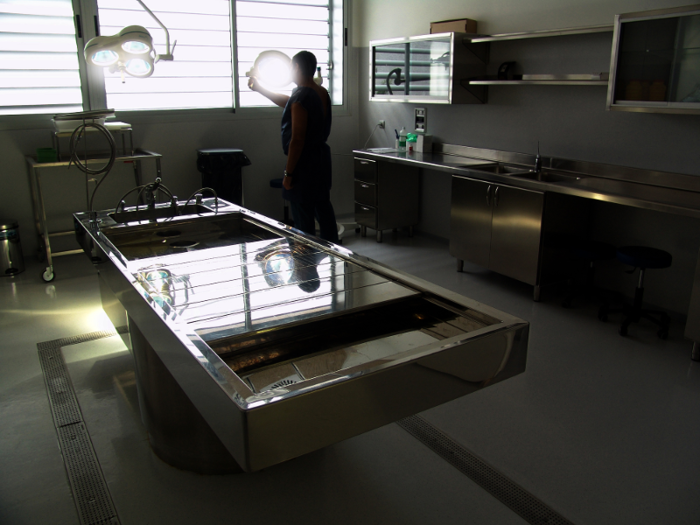- Home
- slideshows
- miscellaneous
- 15 creepy jobs and how much they pay
15 creepy jobs and how much they pay
Psychic

Clown

Average annual gross income: $31,589
Films like "It" and "Joker" certainly haven't helped clowns' reputations. According to H&R Block, clowning appears to be a dying profession — only 15 tax filers listed it as their occupation. No formal education or training is required to become a clown, but many choose to attend clown college in order to hone their skills. Variations of clowns have been around for hundreds of years in cultures across the globe — depictions date all the way back to 2500 BCE in Egypt. While clowns were originally hired to entertain royals and members of the elite class, it seems that nowadays, clowns are more prone to scaring people than making them laugh.
Phlebotomist

Average annual gross income: $34,093
A phlebotomy technician records patient information into a database, draws blood from patients, and labels or prepares the blood specimens for medical testing and possible donation. More than 10,000 tax filers reported that they worked in the profession. No formal education is required, but an associate's or bachelor's degree in phlebotomy can give you a leg up. So, if the sight of blood or needles doesn't give you the shivers, consider becoming a phlebotomist.
Grave digger

Average annual gross income: $35,880
Those who reported working as a gravedigger earned much less than the median annual salary in the US, which was $63,179 in 2018. While this seriously creepy career may not earn you big bucks, most positions don't require formal education. However, due to the physical nature of the job, candidates should be prepared for manual labor — and perhaps things that go bump in the night.
Medical waste workers

Average annual gross income: $38,399
Medical waste workers handle the disposal of hazardous or potentially infectious bodily fluids and contaminants, or anything that may have come in contact with either. Medical waste is generated by healthcare facilities while treating patients. According to MedPro Disposal, medical waste can also include radioactive materials, human fluids, body parts, or animal carcasses. No formal education is required to become a medical waste worker, but those looking to enter this creepy field should be prepared to complete at least 40 hours of training.
Taxidermist

Average annual gross income: $38,688
Taxidermy may not be the ideal career for anyone with a weak stomach. To become a professional taxidermist, certification is required. Most states require a license, and a federally issued permit is required for taxidermists to work with migratory birds. While this creepy career might turn some animal-lovers off, taxidermy is seen by some as an art form and a way to preserve species for study long after their lives end.
Cremator

Average annual gross income: $44,948
While this spooky job might give some people nightmares, it's undeniable that cremators are needed by people all over the world. ZipRecruiter explains that cremators, or crematory operators, ensure that bodies are treated with respect before, during, and after cremation. Training and education are often required to become a cremator. A degree in funeral services or mortuary science is preferred, and cremators must also be trained in ethics, how to operate the machinery, and safety practices in the crematory.
Cemetery worker

Average annual gross income: $51,544
It's never just another day at the office if your office is, well, a graveyard. Cemetery workers are tasked with preparing graves for burial, sometimes including digging the hole and lining it with concrete, placing the casket-lowering device over the grave, and covering the grave with soil after the funeral. Cemetery workers also perform upkeep with the cemetery grounds and other general landscaping duties. A GED or high school diploma may be required, as well as technical knowledge of landscaping, machinery, fields, and gardening. Here's hoping you won't have to work the night shift!
Embalmer

Average annual gross income: $56,457
Embalmers are highly trained professionals who deal with preparing bodies for funeral services. Embalmers must be licensed and most positions require a two-year accredited mortuary science degree. The duties of an embalmer often involve removing blood or other contaminants from the surface of the body, injecting the body with embalming fluid, disguising any damage, and applying makeup to create a more pleasing appearance. Embalmers must get up close and personal with the corpses they work on, but this creepy job certainly plays an important role in society.
Crime scene investigator

Average annual gross income: $57,043
Those looking to enter the world of crime scene investigation should be prepared to deal with gruesome sights, and they should be able to carefully collect and analyze materials that are integral to the success of a criminal investigation. Crime scene investigators may collect hair, tissue, and even bodily fluids from a victim. They might also perform various tests on the body at the scene of the crime. Crime scene investigators are required to have a bachelor's degree in either science or forensic science.
Mortician

Average annual gross income: $60,512
Otherwise known as undertakers, morticians generally deal with preparing a body for burial. They may either work with or replace the funeral director in terms of organizing the transportation of the body from the funeral home to the burial site. The term "mortician" is used less often nowadays, and the position generally falls under the larger umbrella of "funeral director." While some morticians are only required to have an associate's degree in mortuary science, some funeral homes prefer a bachelor's degree. Licensure and a one- to three-year apprenticeship may also be required.
Funeral director

Average annual gross income: $64,231
Funeral directors work with the family to discuss any and all funeral arrangements, including the location and who will preside over the service. Funeral directors also handle legal proceedings such as filing for life insurance and Social Security. They also handle the day-to-day operations of running the funeral home, including overseeing all employees. Funeral directors are most often required to have an associate's degree, some of which is in funeral service, and must be licensed. If this creepy job doesn't frighten you off, you could make a decent salary.
Coroner

Average annual gross income: $77,172
Though coroners do not require the same level of medical training as medical examiners or forensic pathologists, they could be required to complete certification and on-the-job training. Despite not needing a doctorate or even formal medical training, they can still determine the cause of death. However, if an autopsy is needed, coroners will most often consult with a medical examiner or forensic pathologist. Coroners are elected and are often required to be on-call 24/7, potentially making this spooky job also a time-consuming one.
Toxicologist

Average annual gross income: $128,917
Forensic toxicologists may conduct toxicology reports on samples obtained during autopsies, measuring poison and dangerous drug levels in a person's blood in the case of death. Toxicologists also measure poison levels in the air, water, and food that we consume on a day-to-day basis. Toxicologists must be highly trained, and although dealing with poison and toxins may creep you out, you could be paid handsomely for it. An undergraduate degree in toxicology or a related field (chemistry, biology, biochemistry) is required.
Forensic pathologist

Average annual gross income: $150,888
Forensic pathologists are highly trained death investigators and are, in most cases, required to have a doctor of medicine degree as well as two years of fellowship under a forensic pathologist. In cases where the cause of death may be more complicated or mysterious, forensic pathologists might be appointed to investigate in place of a coroner. Forensic pathologists will determine the cause of death, the circumstances leading to death, and anything else the autopsy may reveal about the death.
Popular Right Now
Popular Keywords
Advertisement